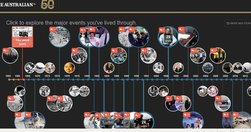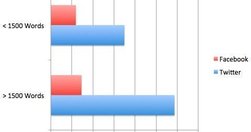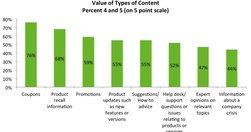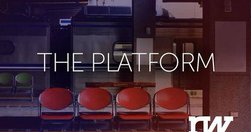Filter 1415 resources:
- disinformation (252)
- news (230)
- media (229)
- content strategy (194)
- social media (165)
- journalism (152)
- facebook (137)
- curation (136)
- storytelling (103)
- blogging (82)
- psychology (79)
- video (78)
- content (76)
- audiovisual (64)
- ai (62)
- community (61)
- native advertising (57)
- factchecking (55)
- us2020 (54)
- filter bubble (50)
- semantic (49)
- blog (49)
- algorithm (49)
- tool (48)
- content marketing (48)
- longform (48)
- cognitive (46)
- data journalism (39)
- bloggingportal (39)
- medium (39)
- promotion (38)
- eu (38)
- trump (37)
- audience research (36)
- design (35)
- productivity (35)
- twitter (33)
- science (32)
- multilingualism (32)
- trust (31)
- politics (31)
- podcast (31)
- myhub (29)
- visualisation (28)
- publicsphere (28)
- data (27)
- authenticity (26)
- augmented reality (26)
- innovation (25)
- visual (25)
- newsletter (24)
- online architecture (24)
- covid19 (24)
- seo (24)
- conspiracy (22)
- backfire effect (21)
- linkedin (21)
- strategy (20)
- communications (20)
- atprotocol (18)
- data visualisation (18)
- science journalism (18)
- mobile (17)
- google (17)
- science communication (17)
- explainer (17)
- enewsletter (17)
- realtime (17)
- democracy (16)
- identity (16)
- advertising (16)
- knowledge management (16)
- comments (16)
- infographic (16)
- bot (16)
- censorship (16)
- virtual reality (16)
- us (16)
- polarization (16)
- ux (15)
- delegitimise (15)
- interactive (14)
- crowdsourcing (14)
- metrics (14)
- information (14)
- stream (13)
- messaging (13)
- clickbait (13)
- gtd (13)
- engagement (13)
- llm (12)
- nytimes (12)
- web design (12)
- personal (12)
- tv (12)
- fediverse (12)
- bloggingportal2 (12)
- propaganda (12)
- digital transformation (12)
- post-truth (12)
- instagram (11)
- confirmation bias (11)
- troll (11)
- gds (10)
- viral (10)
- 2ndbrain (10)
- machine learning (10)
- k4p (10)
- persuasion (10)
- animation (10)
- image (9)
- faq (9)
- business model (9)
- nlp (9)
- creativity (9)
- domestic (9)
- media literacy (9)
- atomisation (9)
- russia (9)
- cms (9)
- ec (9)
- brexit (9)
- newsroom (9)
- ocm (8)
- narratives (8)
- platform (8)
- cards (8)
- 360video (8)
- information architecture (8)
- evidence-based policy (8)
- (8)
- livestream (8)
- ea (8)
- marketing (8)
- qanon (8)
- yanss (8)
- bluesky (8)
- instant articles (8)
- outreach (7)
- blogpocalypse (7)
- top3pods (7)
- cambridge analytica (7)
- editorial (7)
- internal communications (7)
- startup (7)
- buzzfeed (7)
- machine translation (7)
- pr (7)
- privacy (7)
- groupthink (7)
- event (7)
- html5 (7)
- organisation (7)
- regulation (7)
- search (7)
- participation (7)
- web (7)
- open web (7)
- bbc (7)
- collective intelligence (7)
- vote (7)
- circa (7)
- app (7)
- blogger (6)
- theme (6)
- antivaxxer (6)
- deep fake (6)
- climate (6)
- sceptic (6)
- b2b4me (6)
- bestof2015 (6)
- signaltonoise (6)
- bias (6)
- chatgpt (6)
- wikipedia (6)
- euractiv (6)
- persona (6)
- truth (6)
- web20 (6)
- analytics (6)
- policy (6)
- slack (6)
- chat (6)
- vox (6)
- tribe (6)
- suppress (6)
- substack (5)
- sponsored content (5)
- screencast (5)
- decentralised (5)
- uk (5)
- blockchain (5)
- google+ (5)
- obsidian (5)
- framework (5)
- usa (5)
- basic (5)
- zettelkasten (5)
- activitypub (5)
- headline (5)
- open source (5)
- europa (5)
- technology (5)
- facebook live (5)
- hate (5)
- quartz (5)
- memory (5)
- brand (5)
- hoax (5)
- vine (5)
- gender (5)
- inoculation (4)
- moderation (4)
- help (4)
- credibility (4)
- brussels bubble (4)
- fbpaper (4)
- bullshit (4)
- education (4)
- collaboration (4)
- presentation (4)
- machine text (4)
- portal (4)
- echo chamber (4)
- dissonance (4)
- gpt-x (4)
- blm (4)
- moments (4)
- magazine (4)
- corporate journalism (4)
- futurism (4)
- politicoeu (4)
- tools (4)
- influence (4)
- optimisation (4)
- publishing (4)
- knowledge visualisation (4)
- solutions journalism (4)
- humour (4)
- responsive (4)
- guide (4)
- sublime (4)
- guardian (4)
- api (4)
- context (4)
- free speech (4)
- atprotocol lexicon (4)
- leaflet (4)
- management (4)
- europe (4)
- ethics (4)
- youtube (4)
- snapchat (4)
- apple (4)
- history (3)
- lobby (3)
- gamification (3)
- agile (3)
- meaning (3)
- mvp (3)
- rebelmouse (3)
- live (3)
- intranet (3)
- explanatory (3)
- populism (3)
- themes (3)
- ai prompt (3)
- paper (3)
- blogactiv (3)
- gif (3)
- annotate (3)
- signal2noise (3)
- automation (3)
- infowar (3)
- ui (3)
- writing (3)
- coda (3)
- memex (3)
- change (3)
- transmedia (3)
- research (3)
- misinform (3)
- roamresearch (3)
- bundle (3)
- euractiv-com (3)
- tourism (3)
- multimedia (3)
- jeff jarvis (3)
- disruption (3)
- faceted search (3)
- example (3)
- outrage (3)
- wiki (3)
- debunk (3)
- social marketing (3)
- campaign (3)
- personalisation (3)
- andy matuschak (3)
- logo (3)
- powerpoint (3)
- eurosceptics (3)
- hr (3)
- transparency (3)
- survey (3)
- semanticweb (3)
- expert (3)
- ai4communities (3)
- atlantic (2)
- dunning-kruger (2)
- keyword (2)
- attentionweb (2)
- digital garden (2)
- counter speech (2)
- mermaid (2)
- culture (2)
- meerkat (2)
- ltinnovate2016 (2)
- audio (2)
- skills (2)
- iot (2)
- aggrefilter (2)
- conference (2)
- buffer (2)
- infopocalypse (2)
- china (2)
- society (2)
- opencalais (2)
- curatorbot (2)
- sari azout (2)
- australia (2)
- mooc (2)
- crm (2)
- radio (2)
- seenthis (2)
- slideshare (2)
- future (2)
- comics (2)
- whitewind (2)
- homepage (2)
- mybot (2)
- scicomm (2)
- prezi (2)
- colour (2)
- social (2)
- plagiarism (2)
- training (2)
- atavist (2)
- open science (2)
- meme (2)
- drupal (2)
- desirability (2)
- risk (2)
- understanding (2)
- interface (2)
- computational propaganda (2)
- hoaxy (2)
- report (2)
- share (2)
- library (2)
- trending (2)
- learn (2)
- pink slime (2)
- pluralistic ignorance (2)
- balance (2)
- flicc (2)
- mobocracy (2)
- pay4content (2)
- surveillance (2)
- slideshow (2)
- data4policy (2)
- mediafr (2)
- crowdfunding (2)
- tag (2)
- wisdom (2)
- product/market fit (2)
- hosted (2)
- authoritarianism (2)
- sensemaking (2)
- taxonomy (2)
- mastodon (2)
- fomo (2)
- amp (2)
- alpha phase (2)
- local (2)
- fivethirtyeight (2)
- post-alpha (2)
- pitch (2)
- copyright (2)
- fear (2)
- reality (2)
- notification (2)
- osmo (2)
- lean canvas (2)
- euroblog (2)
- usp (2)
- postmodern (2)
- motivated (2)
- ngo (2)
- learning (2)
- project management (2)
- bookmark (2)
- syndicated-translation (2)
- planning (2)
- excalidraw (2)
- river4 (2)
- spambot (2)
- backlink (2)
- reflectivity (2)
- scraping (2)
- photography (2)
- nuzzle (2)
- law (2)
- goals (2)
- eparltv (2)
- usability (2)
- massive.wiki (2)
- tumblr (2)
- simon willison (1)
- map (1)
- framing (1)
- addiction (1)
- humility (1)
- reddit (1)
- cmv (1)
- conversational (1)
- mapping (1)
- dikw (1)
- business (1)
- garden (1)
- compass news (1)
- journal (1)
- psychometrics (1)
- leadership (1)
- inscrutable (1)
- po.et (1)
- truthbuzz (1)
- polbot (1)
- metaphor (1)
- fakebox (1)
- knowledge panel (1)
- wikitribune (1)
- define (1)
- quiz (1)
- expertise (1)
- design thinking (1)
- intro (1)
- ipr (1)
- big data (1)
- happiness (1)
- knowledge illusion (1)
- geopolitics (1)
- power (1)
- eaststratcom (1)
- egovernment (1)
- meeting (1)
- npr (1)
- honesty (1)
- omission (1)
- web development (1)
- it (1)
- online (1)
- circa2 (1)
- team (1)
- storyline (1)
- free (1)
- illusory (1)
- halo (1)
- scrollytelling (1)
- schema.org (1)
- mindfulness (1)
- remote (1)
- open data (1)
- jobtodo (1)
- complex (1)
- fascism (1)
- ideation (1)
- slow news (1)
- storyful (1)
- european (1)
- commonplace (1)
- empathy (1)
- negativity bias (1)
- philosophy (1)
- physics (1)
- assimilation (1)
- biased assimilation (1)
- homophily (1)
- truth psychology (1)
- “illusory (1)
- snowfall (1)
- italy (1)
- euro (1)
- competition (1)
- periscope (1)
- rationality (1)
- spectacles (1)
- glass (1)
- conversation (1)
- vr (1)
- freelancer (1)
- impact (1)
- city (1)
- citizen journalism (1)
- freedom (1)
- user (1)
- trade (1)
- playbook (1)
- wapo (1)
- experience (1)
- liquid democracy (1)
- integrated (1)
- filter (1)
- feed (1)
- mixed reality (1)
- peakbot (1)
- basecamp (1)
- ft (1)
- radicalisation (1)
- whatsapp (1)
- documentary (1)
- viber (1)
- apple news (1)
- upday (1)
- samsung (1)
- adblock (1)
- emergingus (1)
- sidewire (1)
- webgl (1)
- 3d (1)
- line (1)
- syndication (1)
- music (1)
- smartcities (1)
- autonomous (1)
- bitcoin (1)
- text (1)
- cx (1)
- assist (1)
- storymapjs (1)
- monetisation (1)
- partnership (1)
- longreads (1)
- mediumform (1)
- theoretical physics (1)
- einstein (1)
- statistics (1)
- agriculture (1)
- essena (1)
- europcom (1)
- service (1)
- polls (1)
- soonfeed (1)
- guidelines (1)
- eurosceptic (1)
- pressrelease (1)
- fuego (1)
- listicle (1)
- rss (1)
- ios (1)
- routine (1)
- slidecast (1)
- egov (1)
- digg (1)
- gmo (1)
- economics (1)
- networking (1)
- bioethics (1)
- genetic (1)
- nasa (1)
- election (1)
- ep (1)
- game theory (1)
- lofi (1)
- gov2.0 (1)
- apathy (1)
- storyboard (1)
- roi (1)
- raf (1)
- adaptive content (1)
- hive (1)
- cardsort (1)
- trove (1)
- hbr (1)
- eptv (1)
- ntopic (1)
- specialist (1)
- ello (1)
- liveblogging (1)
- boredom (1)
- wikileaks (1)
- shieldlaw (1)
- shortform (1)
- nsa (1)
- fail (1)
- content partnership (1)
- yahoo (1)
- open government (1)
- abtesting (1)
- brain (1)
- evolution (1)
- happeningo (1)
- calendar (1)
- archive (1)
- ipad (1)
- length (1)
- cpms (1)
- rdf (1)
- linked data (1)
- ukraine (1)
- eeas (1)
- smo (1)
- upshot (1)
- tabloid (1)
- mindhack (1)
- chinese (1)
- upworthy (1)
- venue (1)
- python (1)
- civil rights (1)
- seeding (1)
- expiration (1)
- governance (1)
- values (1)
- publicsector (1)
- consultancy (1)
- oecd (1)
- template (1)
- geo (1)
- white papers (1)
- snowden (1)
- kickstarter (1)
- workflow (1)
- trello (1)
- game (1)
- chipotle (1)
- newsana (1)
- newscred (1)
- muckread (1)
- pinterest (1)
- eurocrap (1)
- belgium (1)
- letters2eu (1)
- mojo (1)
- supergirl (1)
- messenger (1)
- vlog (1)
- broadcast (1)
- co-creation (1)
- language technology (1)
- ugc (1)
- primal (1)
- dell (1)
- stanbol (1)
- apache (1)
- epale (1)
- multisite (1)
- rationalisation (1)
- programme (1)
- pilot (1)
- roaming (1)
- eesc (1)
- ifttt (1)
- diigo (1)
- video editing (1)
- google glass (1)
- dellhell (1)
- green (1)
- blogosphere (1)
- disgustology (1)
- data void (1)
- hololens (1)
- ebook (1)
- eu09vs19 (1)
- word2vec (1)
- solr (1)
- micro.blog (1)
- posse (1)
- indieweb (1)
- digital civility (1)
- interoperability (1)
- bookmarklet (1)
- elaboration (1)
- aspire (1)
- category (1)
- saas (1)
- presseurop (1)
- neural link (1)
- geofence (1)
- sociology (1)
- blackpr (1)
- cofoe (1)
- yeats (1)
- threadapalooza (1)
- gatsby (1)
- data portability (1)
- philippines (1)
- euvsdisinfo (1)
- syllabus (1)
- wikinews (1)
- scarcity (1)
- english (1)
- lobbying (1)
- imposter syndrome (1)
- goodwill (1)
- unreality (1)
- circuit-breaker (1)
- delusion (1)
- cui bono (1)
- peace data (1)
- information laundering (1)
- plandemic (1)
- ginsburg (1)
- section230 (1)
- participatory culture (1)
- splinternet (1)
- fleeting (1)
- gab (1)
- planetary (1)
- scuttlebutt (1)
- trust net (1)
- hxc (1)
- early adopter (1)
- bridge (1)
- bridgit (1)
- tiktok (1)
- spaced repetition (1)
- deplatform (1)
- ghost (1)
- mental health (1)
- discord (1)
- arg (1)
- plato (1)
- metaverse (1)
- label (1)
- flipboard (1)
- fedwiki (1)
- uncategorized (1)
- cluetrain (1)
- rebuttal (1)
- bxlsbbl (1)
- lisp (1)
- yellow-card (1)
- specialised (1)
- life-in-belgium (1)
- eparticipation (1)
- information-architecture (1)
- comment (1)
- notion (1)
- reading queue (1)
- think (1)
- argdown (1)
- knowledge graph (1)
- pkm (1)
- ontology (1)
- procrastination (1)
- 3p framework (1)
- d3 (1)
- speech to text (1)
- transcript (1)
- agora (1)
- flancian (1)
- twitter migration (1)
- autosummarise (1)
- perplexity.ai (1)
- nat eliason (1)
- dark forest web (1)
- binggpt (1)
- react (1)
- startupy (1)
- emily m bender (1)
- version control (1)
- bingchat (1)
- compositional (1)
- bard (1)
- ai-image (1)
- adobe (1)
- ai-agent-gpt (1)
- voice (1)
- experiment (1)
- cory doctorow (1)
- joan westenberg (1)
- enshittification (1)
- gpt-4o (1)
- napkin ai (1)
- public affairs (1)
- idpi (1)
- embodiment (1)
- anthropomorphic (1)
- chinese room (1)
- anthropocentric (1)
- reversal curse (1)
- bluesky custom feeds (1)
- justin garrison (1)
- insurrection (1)
- comparison (1)
- sill (1)
- false enforcement (1)
- yanns (1)
- atproto adoption (1)
- cosmik (1)
- laurens hof (1)
- renee diresta (1)
- middleware (1)
- semble (1)
- streamplace (1)
- sovereignty (1)
- gander (1)
- wef (1)
- energy vampire (1)
- ai reasoning (1)
- claude code (1)
Relevant Overviews
- Communication Strategy
- Content Strategy
- Online Strategy
- Online Community Management
- Social Media Strategy
- Content Creation & Marketing
- Online Architecture
- Digital Transformation
- Innovation Strategy
- Communications Tactics
- Psychology
- Social Web
- Media
- Politics
- Communications Strategy
- Science&Technology
- Business
Overview: Content Strategy
Are you creating the content your audience actually wants to consume, or are you just talking about yourself?
What sort of content will your audience read, out of the endless supply at their fingertips? Formal news articles or blog posts from your staff and readers? An event calendar updated daily, or a longread every month? Static web pages, or a deeply granular database with faceted search?
And have you figured out how to get it to them, develop engagement around it, and translate that success into something concrete, fulfilling your mission? How many of the friends and organisations in your network amplify your message regularly?
Need answers? Get in touch.
More services: start with Communication strategy.
Relevant resources

Personalise your storytelling by mining your archives: The Australian launches Storyline: getting something out of its first 50 years and making it relevant to readers.

These figures need to be compared with other research shows that people seem happy to consume long articles on their mobiles. "Ad Age looked at ... Tumblr, WordPress, Blogger to see how their traffic has changed over the last year and what effect [mobile] has had on the time people spend with each service...." On the one hand we read about the …

"the data say longer form media is moving slowly across the social networks of distribution... two opposing trends going on simultaneously. On one end of the curve rabid sharing is driving an attention cycle of seconds but on the other end people are reading and watching more.... The social web has flattened web sites and made the home page…

In Germany, "the government forced Google to pay newspaper editors if they were included in Google News... Google excluded all newspapers from Google News and asked anyone wanting to be listed to reapply explicitly declaring that they renounced to be compensated. All newspaper did reapply not wanting to miss out on the traffic it generates. Google…

“Facts and figures and all the rational things that we think are important ... don’t stick in our minds at all ... stories create “sticky” memories by attaching emotions to things that happen. ... Here’s how to use storytelling to your benefit." Actually pretty basic and theoretical - looking at examples is better - but the key principles here …

"The original converted 7.6% better than the new variation... The leads from the long form version of the page were better in quality ... in most cases long form copy doesn't just boost your conversions, but it also increases your rankings too." Indepth and (inevitably) long analysis. Huge feedback. - How Content Length Affects Rankings and…

"Readers want short, snappy content, ideally under 140 characters or at most a list, right? Well, actually, wrong.... 7 recent studies: long form content is alive, thriving and driving high levels of content performance." Full article summarises 7 more, so I won't summarise it here - read it yourself: - Improve Your Content Marketing with Long …

Sometimes long form content helps with conversions, and sometimes it hurts, and sometimes, long form content is better for SEO, but other times it’s worse" Read the full article to understand why ... and how, and when. Key point: " the best long form content marketing doesn’t make one feel like they’re being marketed to...." - Why Long Form Cont…
"a new media startup aims to bring the ProPublica approach abroad, creating Germany’s first nonprofit investigative news organization... completely focused on data journalism... The team intends to compile and share large datasets that map people in power to the money behind them, collaborating with local open data organizations as well as other n…

"there is a hierarchy of information consumers are looking for.... consumers seem much less concerned with how they receive it than with whether the content itself is well conceived, well executed, useful and honest." - Survey: What Types of Content Consumers Do Want From Brands | FleishmanHillard
Altimiter study finds that while 80% of companeis surveyed said they were "undergoing digital transformation": "... only 25% had actually mapped out the digital customer journey. It’s unfortunate that so much time and resources are going toward programs that may or may not hit the mark." That's a lot of money being wasted. "While the word “digi…

Brown Moses made his name crowdsourcing information in conflict zones, such as analysing weapons in Syria ... from his front room in Leicester, England... using social media, open source tools, and public information to verify details that news organizations can miss. Today, he's launching a site to pool his and others knowledge together in one…
"Two of the biggest trends in news today: the rise of mobile and the rise of data visualization. The unfortunate reality is that they’re often in conflict. ... If you want to do better, check out MobileVis ... Ros also pulls out a set of best practices for doing visualizations for mobile. Data visualization is good. Data visualization that works …

"The Post's new online vertical, Storyline, will cover policy topics through articles, videos and charts -- or "chapters" -- that follow a particular storyline.... avoid "hypothetical policy debates" ... We are going to tell stories with people, with characters, with human drama, in a way that other policy sites don't do very often... depar…
"Could “all you need to know” be the most insidious, reductive, and lame story formula currently conquering our reading life? Everywhere you turn there’s another purported ne plus ultra explainer purporting to tell us “absolutely everything we could possibly need to know” about some current event, some curiosity of history, some deep mystery of li…

"Any time something as complex as SEO is painted in such broad strokes – which many blogs do in order to appeal to a larger audience – there are going to be things left out. And unfortunately for many marketers trying to improve their search rankings, they’re often very important things." Good guide. Particularly like: "Your first priority shoul…

"the Orange is the New Black-inspired content series on women inmates in America cracked the top 10 most read articles on the site, with fifty percent of its traffic coming from social media and 60 percent from mobile. ... time spent ... rivaled time spent with the top New York Times editorial. “ - New York Times adman gushes over native advertis…

Apart from 3 good videos to watch, a good example of content curation... "We have all heard (ad nauseam) about the “power of brand storytelling,” and I know that I have read more than one blog that spits off a numeric list of tips that I just “can’t live without” as a content marketer..." - 3 TED Talks That Uncover the Secrets of Storytelling | …

"those that know how to tell the stories of their work are heard (and subsequently funded) while those who are poor at storytelling are often forgotten and neglected" - Quantum Computing And The Value Of Storytelling In Science - ReadWrite - Station Q, Microsoft: http://www.microsoft.com/en-us/news/stories/stationq/index.html
What does Wierd Al Yankovic have to teach the EU about communications? Watch the video and agree: “Everything, basically”.
How to Spot Liars at Work and How to Deal with Them 45 minutes of psychology, body language, etc. Really insightful into the blind spots we all have, the biases we suffer from which make us distrust honest people with the ‘wrong’ eyebrows or chin, and which make us trust people we shouldn’t on the basis of looks, group membership, vested interest,…

Key "takeaways" (gag), of which the last is hilarious: "- Two-thirds of readers have felt deceived upon realizing that an article or video was sponsored by a brand. - 54 percent of readers don’t trust sponsored content. - 59 percent of readers believe a news site loses credibility if it runs articles sponsored by a brand. - As education level …

"As media companies seek out new ways to make money, is a crisis of trust brewing?"

"I’ve long said that if you have to put a link next to a label saying “what’s this?” then the label clearly isn’t clear enough. ... when I see a link to Forbes on Twitter, I don’t know whether it is going to take me to (1) the good work of a Forbes journalists, (2) the good work of a Forbes contributor, (3) the bad work of one of many Forbes cont…
"When asked to pay for well-reported news content, there’s a growing swell of readers who understand the value and are willing to invest in it. ... We’re seeing a renewed, if still small, consumer commitment to funding journalism ... these models are developing outside the United States... there is relatively little European foundation support…
"Online video is very much here to stay... Even companies such as Vice admit they don't have everything cracked – Vice only launched a news vertical a few months ago after realising its current affairs content was the most popular on YouTube. With that in mind, the three approaches to online video from News UK, Meredith, and Don't Panic may prove…

" News cooperatives have long thrived in Europe ... and Mexico. Yet, with a few exceptions they never really took root in the U.S. That may be changing. " - Kickstarter Bets On Bringing The Slow Europe Model Of Journalism To The U.S. | Fast Company | Business + Innovation
LinkedIn lost my last post, so I expect that this will be my last post there. Apart from announcing that, the post also sets out some of the other problems I’ve discovered with LinkedIn’s attempt to become a blogging platform.I’m not predicting their failure - as my first post pointed out, the concept has huge inbuilt advantages. But any system wh…

"The parliamentary process is indeed so similar to a collaborative software development workflow that it is only natural to try and use a version control tool such as Git to track individual legislative changes." - OpenGov Voices: How GitLaw turns the French parliamentary process into open data - Sunlight Foundation Blog

"blogs are ... just one specific kind of publishing format, with posts that appear in reverse chronological order.... this is a little like saying that a sonnet is just a specific way of ordering text, featuring iambic pentameter and an offset rhyming scheme. Obviously not every blog post is a poem, but there is something inherent in the practice …
Loading more...
Relevant Overviews
- Communication Strategy
- Content Strategy
- Online Strategy
- Online Community Management
- Social Media Strategy
- Content Creation & Marketing
- Online Architecture
- Digital Transformation
- Innovation Strategy
- Communications Tactics
- Psychology
- Social Web
- Media
- Politics
- Communications Strategy
- Science&Technology
- Business